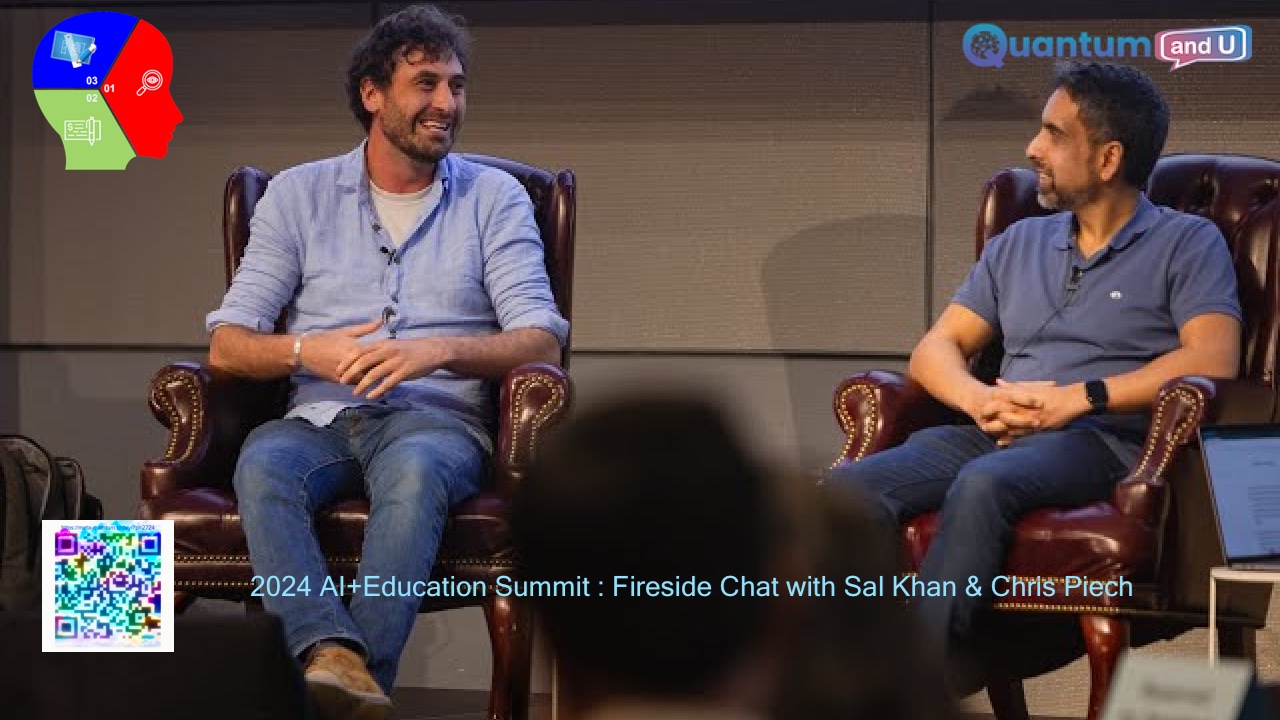
Introduction:
In the insightful Fireside Chat session from the eagerly awaited 2024 AI+Education Summit, distinguished education innovators, Sal Khan, founder of Khan Academy, and Chris Piech, Stanford University’s leading AI professor, delve into a captivating discussion about the year’s evolution and transformation of AI in the education sector.
Throughout the dialogue, they offer valuable insights and firsthand experiences regarding AI’s incorporation into educational practices, the challenges it brings, and potential solutions to these issues.
They also explore future possibilities and potential advancements in this rapidly evolving field. Their discussion illuminates how AI can change the way we learn and teach, and how it can be utilized to create more personalized, engaging, and effective learning experiences.
Education Events in 2024:
There were a few events that took place earlier in 2024:
- Generative AI for Education Leaders Summit (February): This summit in Australia focused on helping education leaders implement generative AI in their schools or institutions.
- AI for Educators Conference (February): This virtual conference offered educators a chance to learn about the latest trends and strategies in AI education.
- AI in Education Forum (APAC) (February): This forum in Singapore brought together educators and experts to discuss the potential of AI in education.
- AI in Education Summit (January): This summit in Mexico focused on the role of AI in shaping the future of education.
- Artificial Intelligence in Education Conference (May): This upcoming conference in Australia will provide a platform for educators to discuss the challenges and opportunities of AI in education.
Video about the Chat with Sal Khan and Chris Piech:
Related to Video Sections:
- Initial Reflections:
- The discussion kicks off with reflections on the rapid evolution of AI in education over the past year.
- Sal Khan humorously recalls past interactions and initial concerns regarding the potential impact of AI, highlighting the shift in perceptions.
- Adoption and Success:
- Sal Khan shares insights into the successful launch of new AI tools, despite initial apprehensions about potential negative feedback from the education sector.
- Chris Piech discusses the dynamic nature of AI models and the challenges of keeping pace with advancements.
- Educator Training and Support:
- The conversation explores strategies for effectively training educators to utilize AI tools in the classroom.
- Chris Piech emphasizes the importance of making AI tools accessible and safe for educators and students alike.
- Ethical Considerations:
- Sal Khan and Chris Piech address ethical concerns surrounding AI, particularly regarding bias and safety.
- They discuss the need for ongoing vigilance and testing to ensure AI models remain ethical and unbiased.
- Global Accessibility:
- The discussion extends to the challenges and opportunities of implementing AI tools in emerging markets.
- Sal Khan and Chris Piech highlight efforts to make AI-powered education more accessible globally, addressing issues of social equity and language barriers.
Impact to SEA and Opportunities:
Southeast Asia stands to gain a lot from the integration of AI in education. How AI is impacting the region and the opportunities it presents:
Positive Impacts:
- Personalized Learning: AI can tailor learning experiences to individual student needs. Imagine AI tutors that adjust difficulty, recommend resources, and identify areas needing improvement. This caters to diverse learning styles and paces, fostering deeper understanding.
- Accessibility Boost: AI-powered tools can bridge the gap for students in remote areas or those with disabilities. Chatbots can provide constant support, while text-to-speech can help visually impaired students access learning materials.
- Teacher Empowerment: AI can become a valuable assistant for teachers, automating tasks like grading and administrative duties. This frees up time for teachers to focus on personalized instruction and student interaction.
- Language Learning: AI can personalize language learning journeys. Imagine interactive programs practicing pronunciation, offering real-time feedback, and catering to specific language goals.
Opportunities:
- Closing the Educational Gap: AI can address the shortage of qualified teachers in certain regions. By providing supplemental instruction and personalized learning experiences, AI can improve educational equity.
- Enhancing STEM Education: AI can make STEM subjects (Science, Technology, Engineering, and Math) more engaging and interactive. Imagine simulations, virtual labs, and personalized learning paths sparking curiosity and deeper understanding.
- Lifelong Learning: AI-powered platforms can deliver targeted learning opportunities throughout a person’s life. This can be crucial in a rapidly changing job market where continuous learning is essential.
Challenges to Consider:
- Teacher Training: Educators need training to effectively integrate AI tools and ensure they complement, not replace, human interaction in the classroom.
- Infrastructure and Equity: Unequal access to technology could exacerbate educational disparities. Governments and institutions need to ensure inclusive access to AI-powered learning tools.
Conclusion:
The Fireside Chat provides insights into the transformative potential of AI in education, while also highlighting the necessity for continuous adaptation and reflection. Sal Khan and Chris Piech foresee a future where AI-powered tools supplement, rather than supplant, human educators, promoting a more personalized and inclusive learning experience. The conversation fuels optimism about the possibilities of AI-enhanced education, stressing the significance of ethical considerations and equal access.
In summary, AI offers a substantial opportunity to revolutionize education in Southeast Asia. By exploiting its potential and tackling the challenges, the region can establish a more personalized, accessible, and effective learning environment for everyone.
Key takeaways:
- The rapid evolution of AI in education presents both opportunities and challenges.
- Educator training and support are crucial for the effective integration of AI tools in the classroom.
- Ethical considerations, such as bias and safety, require ongoing attention and testing.
- Efforts to make AI-powered education accessible globally can contribute to greater social equity.
- AI has the potential to revolutionize education by lowering thresholds for learning and fostering creativity.
Related References:
- Khan Academy: https://www.khanacademy.org/
- Code in Place: https://codeinplace.stanford.edu/
- OpenAI: https://openai.com/
- Google AI: https://ai.google/







